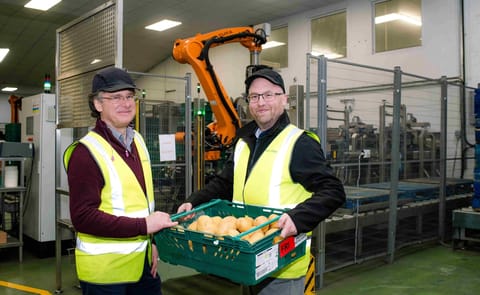Although potatoes are for most people not the first food that comes to mind as a source of anti-oxidants, potatoes ARE an important source for healthful anti-oxidants and polyphenols.
Now Japanese Scientists have found a way to boost the anti-oxidant levels even further: stress them out by electric currents or ultrasound.
Scientists today reported discovery of two simple, inexpensive ways of boosting the amounts of healthful antioxidant substances in potatoes. One involves giving spuds an electric shock. The other involves zapping them with ultrasound, high frequency sound waves.
Those new insights into improving the nutritional content of one of the Western world’s favorite side dishes were reported today at the 240th National Meeting of the American Chemical Society (ACS), being held here this week. The study was among nearly 8,000 scientific reports scheduled for presentation at the meeting, one of the largest scientific gatherings of 2010.
“We found that treating the potatoes with ultrasound or electricity for 5-30 minutes increased the amounts of antioxidants — including phenols and chlorogenic acid — by as much as 50 percent,” said Kazunori Hironaka, Ph.D., who headed the research. “Antioxidants found in fruits and vegetables are considered to be of nutritional importance in the prevention of chronic diseases, such as cardiovascular disease, various cancers, diabetes, and neurological diseases.”
Hironaka, who is with Obihiro University in Hokkaido, Japan, indicated that the process could have widespread commercial application, due to growing consumer interest in so-called “functional foods.” Those are products like berries, nuts, chocolate, soy, and wine that may have health benefits beyond traditional nutrition. Such foods may promote overall good health, for instance, or reduce the risk of specific diseases. Hironaka estimated that sales of such products in the United States alone now approach $20 billion annually,
“We knew from research done in the past that drought, bruising, and other stresses could stimulate the accumulation of beneficial phenolic compounds in fresh produce,” Hironaka explained. “We found that there hasn’t been any research on the healthful effects of using mechanical processes to stress vegetables. So we decided in this study to evaluate effect of ultrasound and electric treatments on polyphenols and other antioxidants in potatoes.”
The ultrasound treatment consisted of immersing whole potatoes in water and subjecting them to ultrasound for 5 or 10 minutes. For the electrical treatment, the scientists immersed potatoes in a salt solution for 10 seconds and subsequently treated the spuds with a small electrical charge for 10, 20, and 30 minutes. The study team then measured antioxidant activity and the phenolic content and concluded that the stresses increased the amount of these compounds. The 5 minutes of ultrasound, for instance, increased polyphenol levels by 1.2 times and other antioxidants by about 1.6 times.
Solapas principales
Boosting anti-oxidant levels in potato with electric currents or ultrasound

¿Te gustaría recibir noticias como esta por correo electrónico? ¡Únete y suscríbete!
Get the latest potato industry news straight to your WhatsApp. Join the PotatoPro WhatsApp Community!
Empresa Destacada
Contenido Patrocinado
Contenido Patrocinado
Contenido Patrocinado
Contenido Patrocinado







